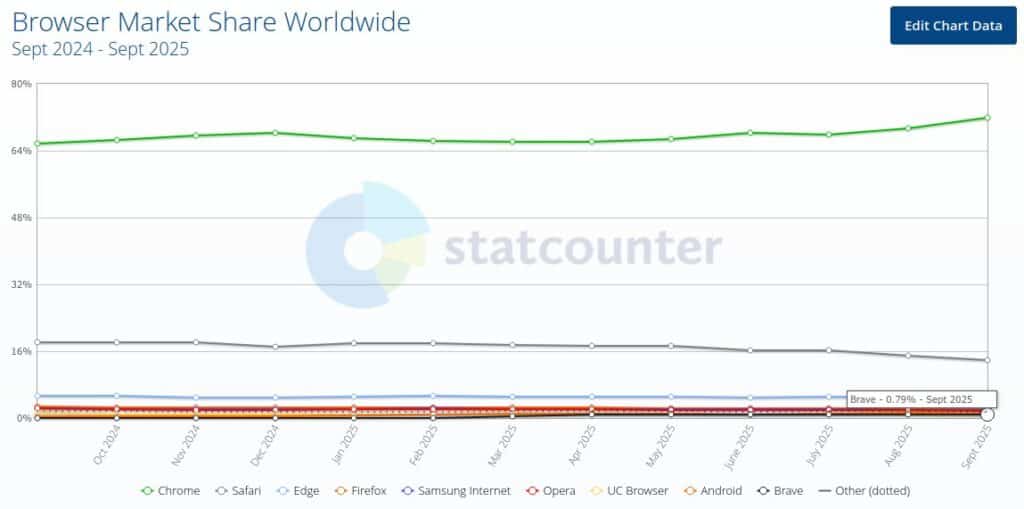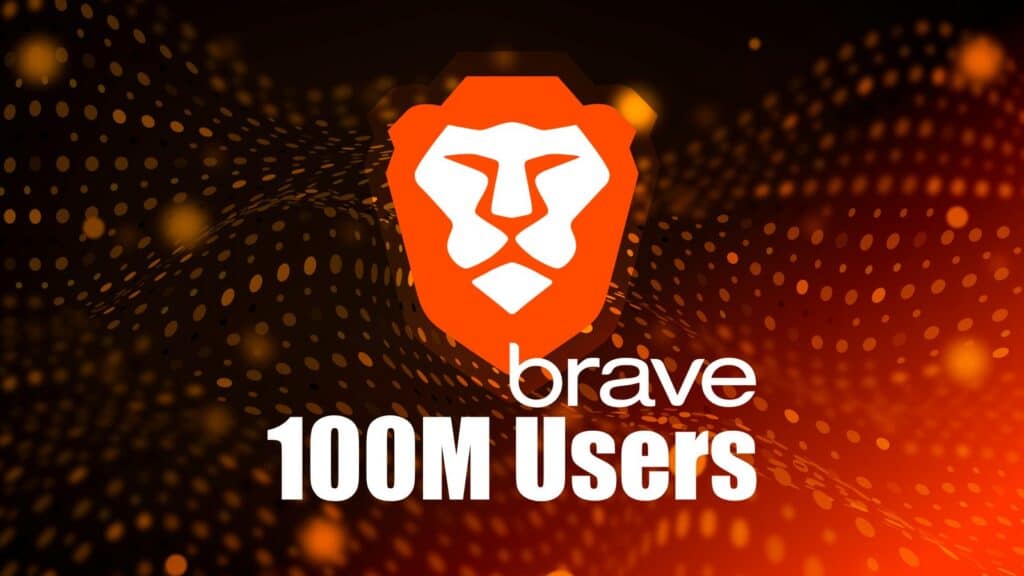Just a few days after rolling out AI features, the privacy-focused Brave browser is back with another announcement—this time about its growing user base. As of September 30, Brave reported 101 million users across desktop and mobile devices, marking a significant growth milestone for the project.
Alongside that, Brave Search—powered by its own independent index—has now reached nearly 20 billion annualized queries. On a daily basis, Brave Search handles more than 50 million queries, with about 15 million of those tapping into its AI-generated results.
It’s interesting to note that, in the EU, for example, Brave’s iOS installations jumped 50% after Apple rolled out its browser choice screen in iOS 17.4, following the implementation of the Digital Markets Act. And while those numbers are impressive, let’s take a quick, independent look at the stats to see where the browser really stands worldwide in terms of usability.
We’ll start with StatCounter’s worldwide browser market share numbers from the past year. No surprise here—Google Chrome still dominates, with more than 70% of users sticking with it. Way behind in second place is Safari, at just under 14%. Rounding out the top three, Microsoft Edge comes in at under 5%.
According to the numbers, in September 2025, Brave comes in ninth with 0.79% of the overall user base. That’s down from 0.87% back in April, a drop of about 0.08%. This isn’t meant to dismiss the company’s figures—it’s just another way of looking at the data.

Additionally, it’s also worth looking at the Firefox Public Data Reports, since a lot of the new Brave users are probably people making the switch from Firefox. The numbers seem to support this, at least to some degree.
At the end of last year, Firefox had about 163 million users. By September 2025, that number had dropped to 154 million—almost 10 million fewer. It’s not exactly shocking, though. Mozilla had already shown signs of trouble earlier this year when it shut down several services that people had grown accustomed to. Furthermore, the recent push to integrate AI features into the browser has been met with mixed reactions from users.

Speaking of AI, Brave’s recent announcement about adding AI features to its browser, well… can spark a mixed reaction. After all, when your biggest selling point is privacy, bringing AI into the mix is bound to make some folks a little skeptical. Anyway. Back to Brave.
Another factor contributing to the browser’s growing popularity may be the steady rise of Linux, which now accounts for more than 4% of desktop users. As we know, Linux enthusiasts tend to care deeply about privacy. So it’s not a stretch to think plenty of them are picking Brave as their go-to browser.
Brendan Eich, CEO and co-founder of Brave, described the 100 million milestone as more than just a number:
“Across the globe, users are choosing privacy and control over their online experience, instead of Big Tech’s tracking and abuse.”
From a business standpoint, things appear to be going well. Brave VPN has nearly 100,000 paying subscribers. Additionally, Brave Ads has gained traction with major companies, including Amazon, Ford, and eBay.
Last, but not least, on the search side, Brave is one of only three independent search engines operating at scale in the West. Unlike competitors that rely on Bing or Google data, Brave runs its own index and has opened it up to developers through the Brave Search API.
In conclusion, Brave deserves credit for what it has accomplished so far—it’s no small achievement. Still, despite the progress, the browser remains far behind the market leaders, and achieving a higher ranking will be a challenging goal. But who knows? Only time will tell.

I use brave as my main browser on linux and have firefox as a backup browser.
The other way around for me. Both on Linux and on Android.
I really like Brave, but on desktop I find tabs on top of URL bar to be extremely counter-intuitive. And Firefox is the only browser you can still achieve tabs below.
I’m using Brave search as primary search engine everywhere though. I got tired of google search engine wokeness.
that is cool. I really like brave on linux but on android I had issues with it pausing before loading things so I currently use firefox and duckduckgo as backup browser. I will probably try again after some more time has passed to see if issue is gone since I would like to use it on android also.
I have no desire to use a browser that has AI features. I want absolutely nothing to do with AI. The U.S. and the rest of the world are obsessed with AI. It will come back to haunt them in the future.
“The development of full artificial intelligence could spell the end of the human race.”
– Stephen Hawking (1942-2018) – World renowned English theoretical physicist, cosmologist and author who suffered with ALS from age 21.
“I, Robot” (2004)
https://www.imdb.com/title/tt0343818/?ref_=fn_all_ttl_1
then i guess you better not use firefox either. I guess you could use vivaldi which promises no ai but I found that browser annoying with all the ad based bookmarks and shortcuts that I removed only to find links to them again somehow when typing. The browser felt like a piece of adware. I am not using ai on brave or firefox since you can easily avoid it and if you do not like default search you can switch it.
FYI, I am NOT using Firefox!
a few more years and brave may have more users then firefox since firefox only seems to shed users while brave seems to gain users
https://data.firefox.com/dashboard/user-activity
over a 100 million is a amazing accomplishment.